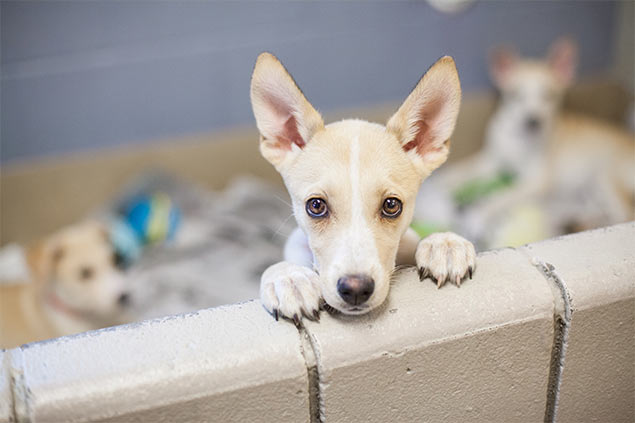
Spaying or Neutering Your Pet
The most responsible decisions you will ever make as a pet owner.
Choosing to spay or neuter your pet is one of the most responsible decisions you will ever make as a pet owner. Spaying or neutering your pets will help them to live healthier, happier and longer lives. Spaying or neutering pets also prevents animals from being born accidentally, and is the most effective and humane way to save animal lives.
Spaying helps prevent mammary tumors and uterine infections, and neutering helps prevent testicular cancer and avoid potential prostate problems. There are also several behavioral benefits. Spayed female pets won’t go into heat and neutered male pets are less likely to roam away from home, less likely to mount other dogs, people and inanimate objects and less likely to mark their territory with urine.
We offer affordable spay and neuter services for young, healthy dogs and cats. The procedure is done in our office and your pet will go home with you the same day. We perform a pre-surgical exam on the day of surgery and if our doctor finds anything that may indicate diagnostics or more supportive care during surgery, we will call you prior to the procedure. Your pet will also go home with pain medication for post-operative pain management.
There’s no definite answer to when pets should be spayed or neutered. Cats can have their first heat earlier than dogs, so we like to see them in for spay or neuter surgery by six months old. For dogs, the traditional age is 6 to 9 months old, but larger dogs and certain breeds may receive more benefits if they wait longer. It’s not unusual for certain dogs to be 24-months old when they are spayed or neutered. The procedure also depends on your pet’s lifestyle, comfort level and ability to deal with heat cycles and roaming behavior. Please discuss the best time to have your pet spayed or neutered at your pet’s next wellness examination. It’s the perfect time to determine a schedule of care for your four-legged friend.
If you have further questions about the spayed and neuter procedures or would like to schedule the surgery for your pet, contact our office at your convenience.
What is spay and neuter?
A spay is the surgical removal of a female animal’s reproductive organs so she cannot become pregnant and a neuter is the surgical removal of a male animal’s testicles so that he cannot impregnate a female. The surgeries are performed by a veterinarian while animals are under general anesthesia so that they do not feel pain. An animal may experience some discomfort after the surgery, but we provide medication to help ease the soreness.
Benefits for you and your pet
Your companion will live a longer, healthier life and you will experience fewer headaches if you get him or her spayed or neutered. Spaying and neutering reduce or eliminate:
- The odds of mammary cancer and dangerous uterine infections in females and prostate problems and testicular cancer in males.
- Frustration in resisting the natural urge to mate. Your companion will be less distracted, more easily trained, and a more contented member of your family.
- The animal’s need to roam in search of a mate, decreasing the chances that your pet will become lost, get into fights with other animals or be hit by a car.
- Messy heat cycles in females and attracting unwanted males.
- The tendency to bite. However, your pet will still be protective of his home and family even after being altered. Aggression is different from protectiveness.
- Spraying, wailing, marking territory, or making inappropriate sexual approaches toward people or objects.
- The extra expense for food or veterinary care in the event of an unexpected litter of puppies or kittens.
Spaying and neutering help reduce the number of strays and unwanted animals in a community. Last year in Georgia, more than 215,000 pets were taken into animal shelters. Of those, some 154,000 were returned to their families or adopted, but 42,000 of them were put to sleep.
Not to mention the dangers and risks associated with stray animals, communities spend millions of tax dollars every year to provide care for unwanted, abandoned and neglected animals.
What is the cost?
The cost of a spay or neuter surgery depends on the weight and sex of your pet, whether or not your pet requires vaccinations and a number of other variables. It is important to remember, however, that it is a small, one-time cost compared to the numerous benefits it provides, and the number of unwanted issues it will help you and your pet avoid.

